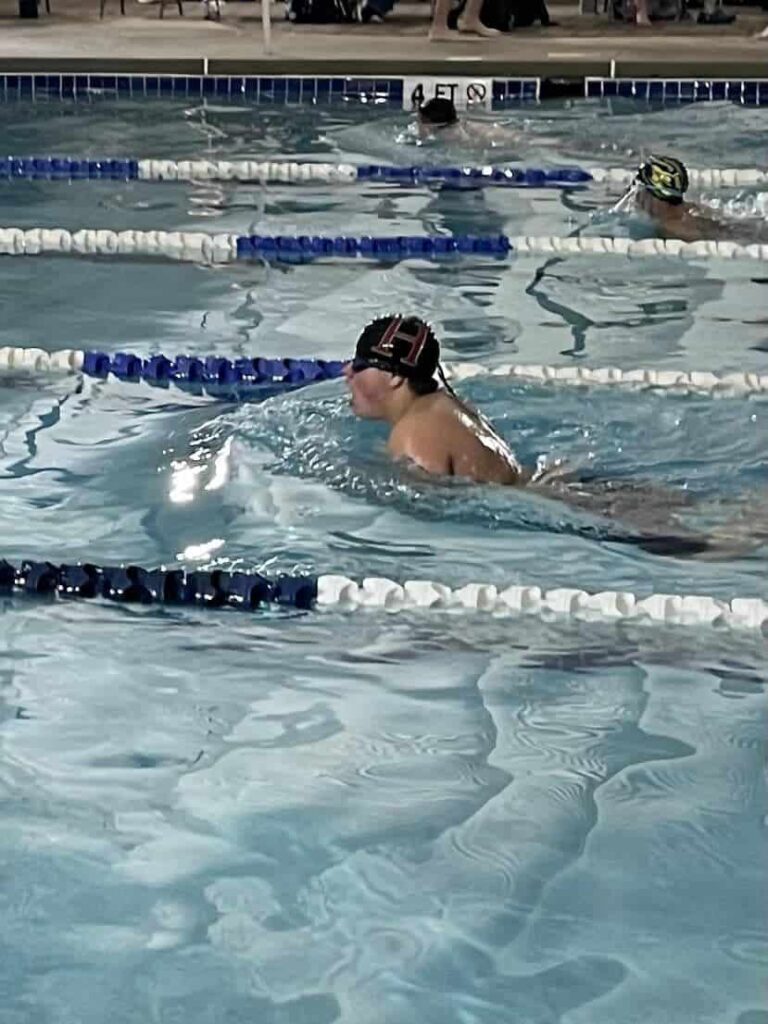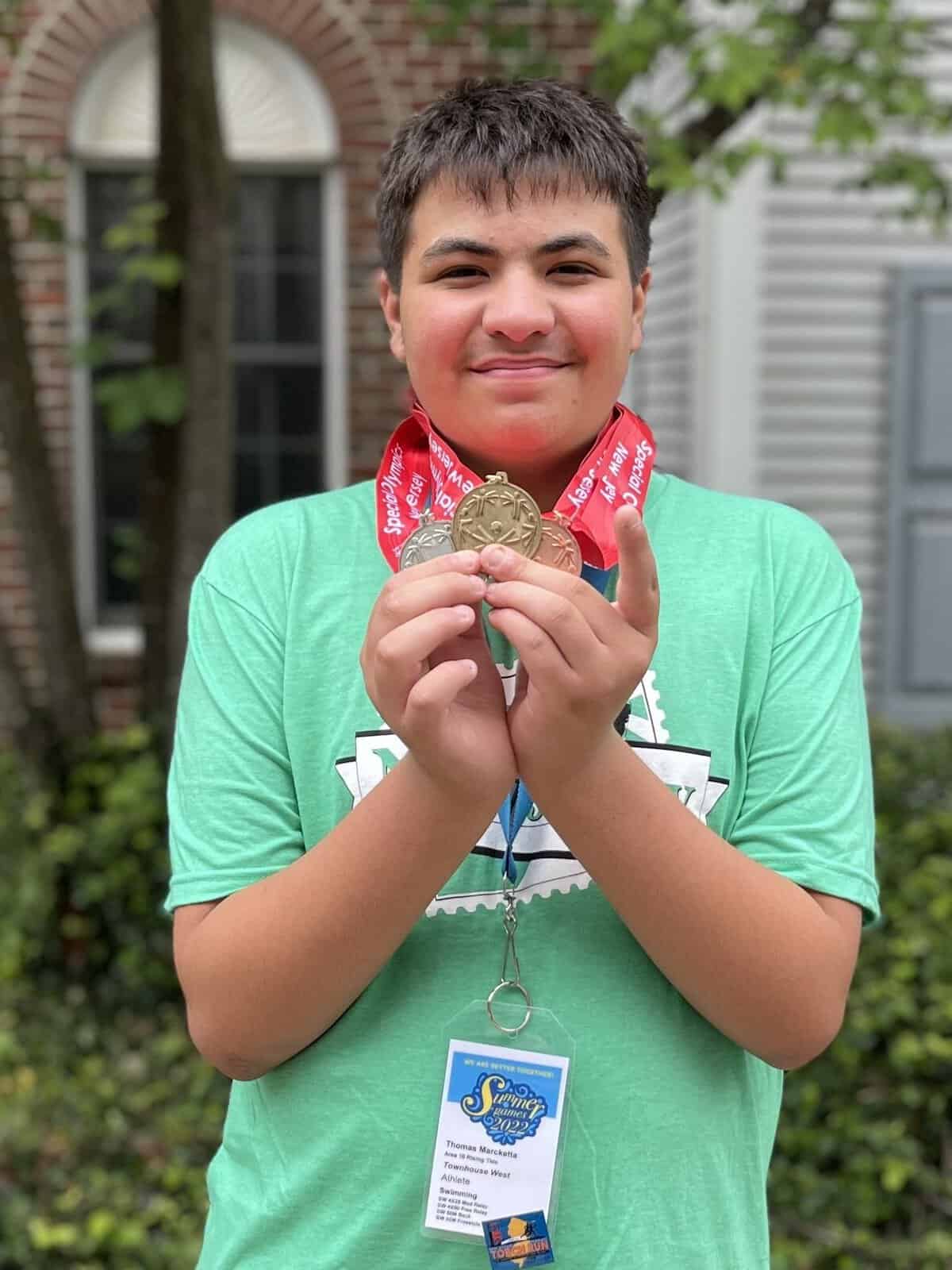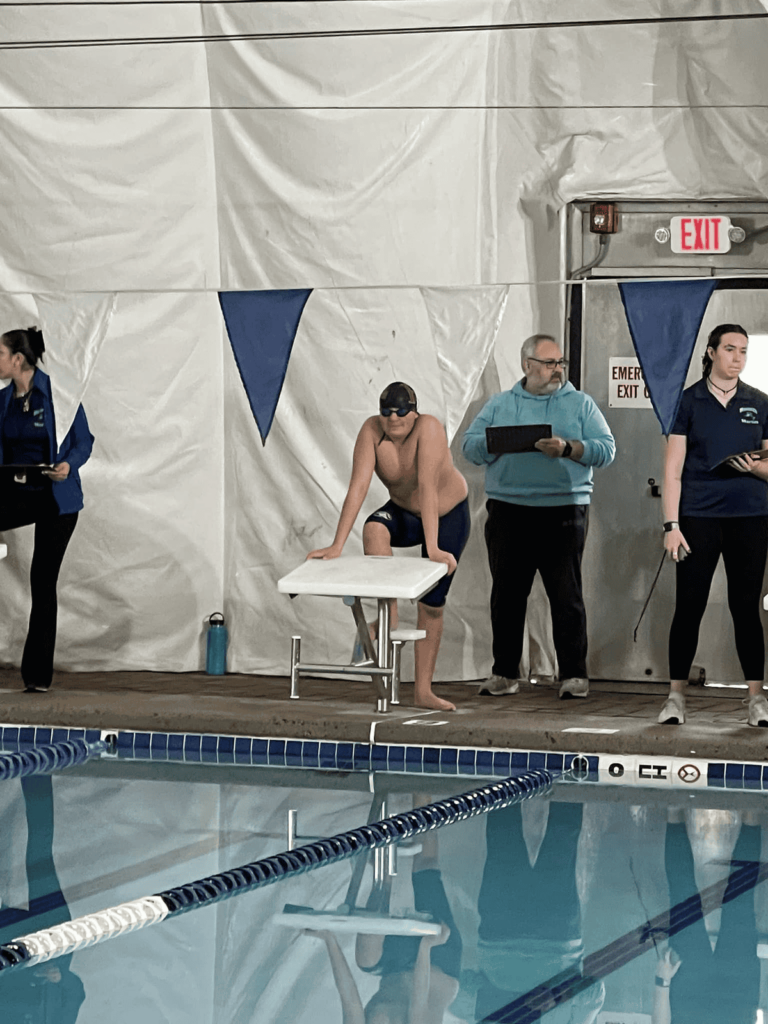Tommy Marcketta did not let his autism spectrum disorder deter him from his goal of joining the Hillsborough High School swim team
Meet Tommy Marcketta, a freshman at Hillsborough High School, and his mom Elizabeth.
When he approached his mom about joining the school’s swim team, she initially had some hesitation. While Marcketta is an accomplished Special Olympics swimmer, he was diagnosed with autism spectrum disorder (ASD) at age 7. It has affected his social and emotional skill development and can make new situations and environments difficult for him to navigate.
“Tommy generally becomes overwhelmed very quickly in new situations and also by noise,” Elizabeth said.
However, she said they have been “so lucky to have fantastic swim coaches at Hillsborough High School.”
“I spoke with them in advance about my concerns and they were more than willing to help Tommy feel comfortable so he could swim his best at try outs,” she said. “They walked him through what the day would be like so he knew what to expect. They also allowed me to come to the YMCA while they were holding the tryouts.”
Once on the team, Tommy said it took him a little while to feel like he fit in. But that all changed by the end of the season.
“I felt like I was actually part of the team. Because I was.”

Every April is Autism Awareness Month. Tommy and his mom shared their story recently with the Hillsborough Beacon.
Tommy’s ASD diagnosis when he was 7
Elizabeth: Since Tommy was very young, I knew that he had a hard time with certain things, such as changes in routine, moving on from playing with something he likes, loud noises and crowded spaces. It wasn’t until he was in kindergarten though that we realized how different he was from his peers. I sought a developmental evaluation then and the wait lists were so long everywhere. I finally found a private practice pediatric psychiatrist who was taking new patients. She diagnosed Tommy with ADHD (Attention-deficit Hyperactivity Disorder) and anxiety. This sort of made sense, but didn’t explain everything.
Elizabeth started reading about developmental disorders and came across a description of what used to be known as Asperger’s syndrome.
“Reading the description, it felt like every light in my head turned on – Tommy hit every single bullet point,” she said. “I called the psychiatrist and asked if we could talk about the possibility that Tommy is autistic. She said ‘no. No conversation, no to exploring the diagnosis. Just no.’”
The next year, Tommy’s little sister Ella was seeing a developmental specialist and while we were going through our family history she asked extensively about Tommy. She finally asked if he had ever been evaluated. I answered that yes, and I thought he was autistic. Her response was, “It sounds like it. I need to see him.” She found a spot for an evaluation appointment six weeks later and diagnosed him at that appointment.
To be honest, I felt relieved hearing the diagnosis. It explained why so many things were hard for Tommy – and it wasn’t that I was bad at being his mom, it was that I needed to learn how to support him differently.
What led Tommy to the water?
Elizabeth: Tommy has always loved the water. He began swimming competitively in 2019. Special Olympics is unlike any other organization we have encountered. Because the whole program is designed for individuals with disabilities, the coaches are trained to work with what the athlete can offer. In 2019, for Tommy that meant 25 meters of freestyle – and that was a stretch. But what we found was that the team accepted him and he finally had a place where he felt like he fit in and could be himself. Special Olympics divides athletes into divisions based on their skill level and age, so they are competing against athletes similar to themselves.
This motivated Tommy because he finally felt like he could keep up. Two years ago, Tommy asked me how he could get better at swimming. We talked with his Special Olympic swim coach who recommended one-on-one lessons to work on his swim strokes. Tommy doesn’t have the body awareness to look at someone and copy their actions – so he needed someone who understood that and would help him learn how he was able to learn. The instructor that his coach found us was excellent and Tommy got much better pretty quickly. He went on to swim at the New Jersey State Games and earned bronze, silver and gold medals.
This year he is swimming much longer events. At the area meet last month he won gold in five events, including 200-meter freestyle. He has come so far.
Tommy likes pretty much everything about swimming. He likes that he is competing against himself, he likes being able to plan what he is going to do – as opposed to a sport like soccer where he has to react to the other players on the field – and he likes the way swimming makes his body feel.
Freshman year and the swim team
Tommy: My favorite stroke is freestyle, but I’m better at backstroke.
My year at the high school started out hard. There are just so many people there all at the same time. But I asked my mom for help and she called my OT (occupational therapist) who helped me. After that it got easier. I have friends who I really like and let me be myself and I am getting good grades. The swim season was really fun. It was hard work and sometimes I wasn’t sure if I had made the right choice, but now I know I did.
The other kids are nice and I liked going to the team pasta parties. One night some of the kids were shaving their heads so I let them shave mine as well. We won the sectional championship and went to the semifinals, which was exciting.
Therapy at Children’s Specialized Hospital (CSH)
Elizabeth: We have been so lucky to have fantastic therapists at CSH. Tommy has had OT and physical therapy over the years. We did not focus on social skills. Tommy is who he is and we don’t want to change him. Instead, we focused on sensory regulation, identifying what he is feeling and how it is affecting him and problem solving.
Tommy is extremely comfortable at CSH. He knows he can be himself and everyone that he encounters is there because they want to help kids like him. Because he feels at home, and [because] his therapist took the time to earn his trust, he is able to work on skills with her that he wouldn’t be able to learn under other circumstances. This helps him function better in all aspects of life.
When he can prevent himself from becoming overwhelmed at school, he learns better. Tommy also applies the strategies he learned in OT to keeping himself calm and focused during practice and meets. Because he received the support he needed he was able to not only participate on the team, but also keep on top of his school work. And he enjoyed it all.
In the past he frequently worked on just getting through stressful situations so him being able to keep himself regulated and have fun was huge.
Advice for other parents/students
Elizabeth: For other parents, I would say to always trust your gut. I wish I could go back and tell myself to keep seeking answers after the first doctor refused to discuss any other diagnosis. I’m so grateful that we eventually did get our answers.
I would also recommend working to build positive relationships with the other adults in your child’s life. If they have an IEP (Individualized Education Program), keep the case manager informed on the great things your child is doing, not just the struggles. Same with their teachers – they love to hear about the fun things your child is involved in.
Volunteer in the schools if you can, it’s a great way to get to know the people who spend so much time with your child.
Seek out experts who can help you understand your child. I wish I could be the one to give Tommy everything he needs. But I can’t, so I needed to find people who could help me learn.
Also, for any parent questioning if they should take their child for an evaluation. Do it. I’ve never met a parent who regretted learning more about their child. And if they do have a diagnosis, tell them. For Tommy, learning he was autistic was an eye opener. His first question was, “Does that mean there are other people who feel like me?” He knew he was different but thought he was alone.
Tommy: Always be yourself. If you need to change who you are to fit in or join an activity, then it’s not the right one for you. And ask for help when you need it. Adults will usually listen when a kid asks for help. If they don’t, find someone else who can help you.
In September, I was having trouble with geometry so I emailed my case manager and asked if we could meet. She said ‘yes’ right away and we fixed the problem.
Tommy to parents: Listen when your kid tells you something. They may not always be able to use words to explain how they feel, but if they’re upset, don’t tell them they are ‘OK.’


